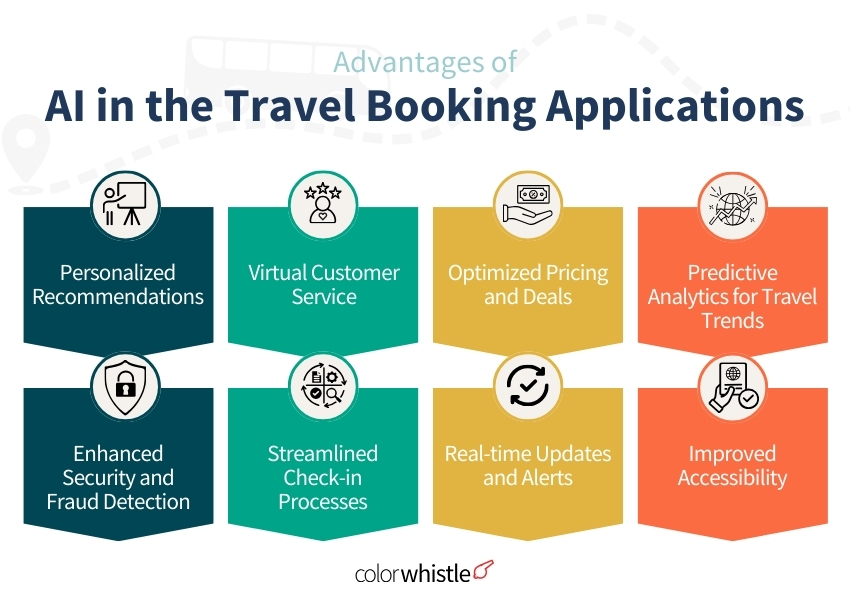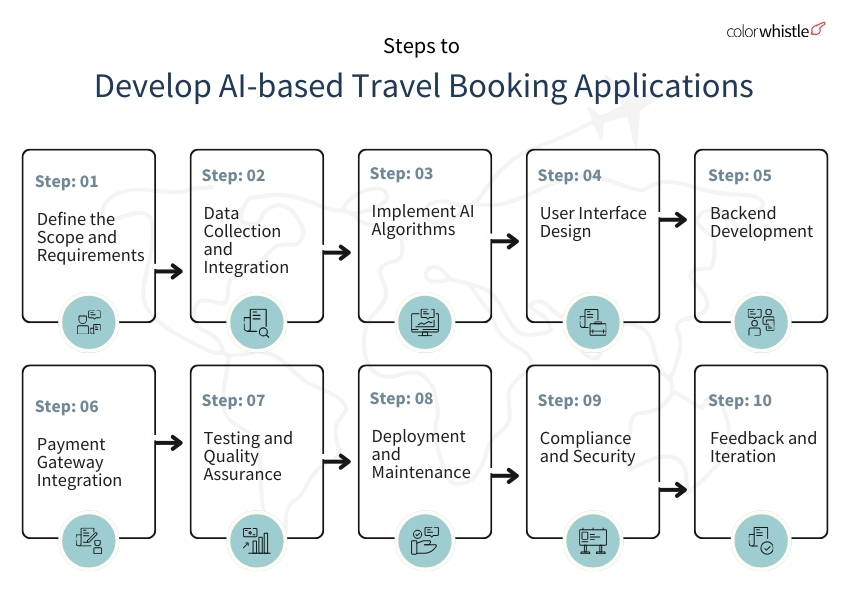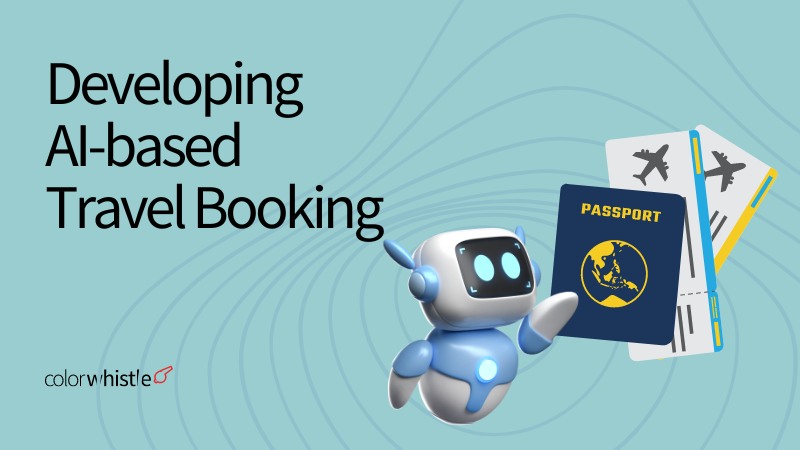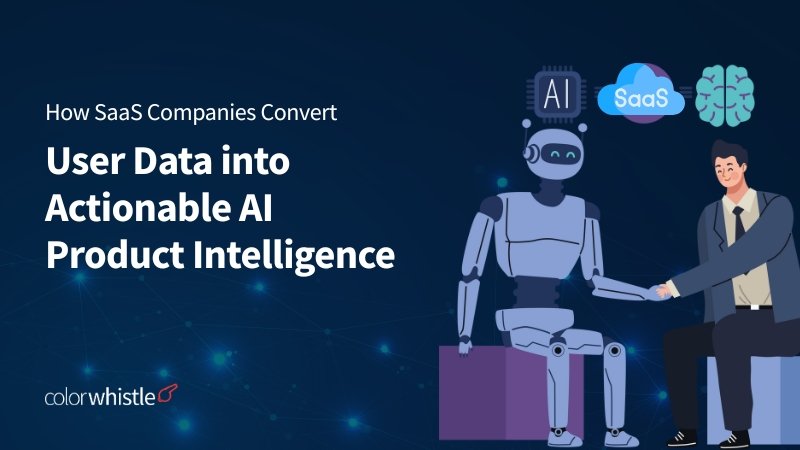In a survey conducted among travelers worldwide regarding their trust in Artificial Intelligence (AI) for trip planning in 2033, accommodation planning emerged as the most favored aspect. A significant 75 percent of respondents expressed their readiness to rely on AI for this purpose.
With technology playing an ever-growing role in travel, there’s a rising demand for travel app development services from web app development companies. From client management via emails to AI-driven suggestions, technology is omnipresent. Developing AI-based travel booking applications involves leveraging advanced tech for personalized recommendations, virtual customer service, and streamlined processes, revolutionizing the industry.
We are a website development company, and as the AI trend is evolving, we made it a point to discuss developing an AI-based travel booking application. Where we brainstormed on the challenges, and solutions while developing an AI-based travel booking application, which helped us in analyzing the enhancement required in our travel website development services.

AI-powered tools like ChatGPT are being utilized by companies such as Airbnb and HomeToGo to provide personalized travel planning and itinerary generation based on specific preferences
Also Read
How to Develop AI-based Travel Booking Applications?

Step 1-Define the Scope and Requirements
Understand what functionalities you want your travel booking application to have, including flight bookings, hotel reservations, car rentals, itinerary planning, and more. Also, decide on the target audience and the platforms (web, mobile, etc.) you want to support.
Step 2-Data Collection and Integration
Gather data from various sources such as airlines, hotels, car rental companies, and other service providers. APIs (Application Programming Interfaces) are commonly used to integrate this data into your application.
Step 3-Implement AI Algorithms
AI algorithms are crucial in enhancing user experience and providing personalized recommendations. Here are some AI techniques commonly used in travel applications:
- Natural Language Processing (NLP): Implement NLP to understand user queries and preferences. This could involve parsing user input to extract entities like destination, dates, and preferences.
- Machine Learning (ML): Use ML algorithms to analyze user behavior, preferences, and historical data to provide personalized recommendations for flights, hotels, activities, etc.
- Recommendation Systems: Implement recommendation systems to suggest destinations, accommodations, activities, and travel packages based on user preferences and past behavior.
- Predictive Analytics: Utilize predictive analytics to forecast demand, price trends, and availability for flights, hotels, and other travel services.
Step 4-User Interface Design
Design an intuitive and user-friendly interface for your application. Ensure seamless navigation, easy search functionalities, and clear presentation of information.
Step 5-Backend Development
Develop the backend infrastructure to handle user requests, process data, and communicate with external APIs. This involves setting up servers, and databases, and implementing business logic.
Step 6-Payment Gateway Integration
Integrate payment gateways to facilitate secure and convenient transactions for booking flights, hotels, etc.
Step 7-Testing and Quality Assurance
Thoroughly test your application to ensure it functions as intended across different devices and platforms. Test for usability, performance, security, and reliability.
Step 8-Deployment and Maintenance
Deploy your application to the desired platforms (e.g., app stores, web servers) and monitor its performance. Regularly update and maintain the application to fix bugs, add new features, and improve user experience.
Step 9-Compliance and Security
Ensure your application complies with relevant regulations such as GDPR (General Data Protection Regulation) and incorporates security measures to protect user data and transactions.
Step 10-Feedback and Iteration
Gather feedback from users and iterate on your application based on their suggestions and experiences. Continuously improve and refine the application to meet the evolving needs of travelers.
Singapore’s Changi Airport exemplifies this trend by leveraging facial recognition technology for automating check-in, security, and boarding procedures.
Challenges Faced While Developing an AI-based Travel Booking Application – Solutions from ColorWhistle
Data Quality and Integration
Gathering and integrating data from various sources such as airlines, hotels, and car rental companies can be challenging. Ensuring this data’s quality, consistency, and reliability is crucial for accurate recommendations and bookings.
Solution
We utilize reliable APIs and invest in robust data collection, and integration processes, including data cleansing and validation techniques.
Complexity of Travel Preferences
Understanding and accommodating the diverse travel preferences of users can be complex. Preferences can vary based on budget, destination, travel dates, accommodation preferences, and personal interests. Designing AI algorithms that can accurately interpret and cater to these preferences is a challenge.
Solution
Implement user-friendly interfaces with intuitive filtering options and preference settings. Utilize AI algorithms to analyze user behavior and feedback to dynamically adjust recommendations and personalize the user experience.
Natural Language Understanding
Building robust natural language processing (NLP) capabilities to understand user queries and requests accurately is a challenge, as travel-related queries can be complex and ambiguous.
Solution
Train NLP models specifically tailored to understand travel-related queries and requests. Utilize pre-trained language models and fine-tune them with domain-specific data to improve accuracy.
Personalization and Recommendation Accuracy
Providing personalized recommendations tailored to each user’s preferences and past behavior requires accurate machine-learning algorithms. Ensuring the accuracy and relevance of these recommendations is crucial for user satisfaction and engagement.
Solution
Continuously refining and optimizing machine learning algorithms based on user feedback and data analytics. Implement A/B testing to evaluate the effectiveness of different recommendation strategies and iterate accordingly.
Dynamic Pricing and Inventory Management
Handling dynamic pricing and inventory management for flights, hotels, and other travel services is challenging. AI algorithms must be capable of analyzing pricing trends, demand fluctuations, and inventory availability to provide users with optimal booking options.
Solution
The implementation of real-time data analytics and predictive modeling can help in forecasting pricing trends and inventory availability.
User Interface Design
Designing an intuitive and user-friendly interface that effectively incorporates AI features without overwhelming users can be challenging. Balancing complexity with simplicity is crucial to ensure a positive user experience.
Solution
Conduct user research and usability testing to design an intuitive and visually appealing interface. Utilize responsive design principles to ensure compatibility across different devices and screen sizes.
Continuous Improvement and Adaptation
The travel industry is constantly evolving, with new trends, technologies, and user preferences emerging regularly. Continuously improving and adapting the application to meet changing demands and stay competitive is an ongoing challenge.
Solution
Establish a culture of continuous improvement and innovation within the development team. Regularly solicit feedback from users and stakeholders to identify areas for enhancement and prioritize feature updates accordingly.
Also Read
The Travel Industry and AI
Based on data from Statista, the worldwide AI in the travel market achieved a valuation of $81.3 billion in 2022. Projections indicate significant growth, with expectations to soar to $423.7 billion by 2027, reflecting a robust compound annual growth rate (CAGR) of 35% over the period from 2022 to 2027.
AI-driven chatbots, such as ChatGPT, offer travelers immediate responses to their inquiries and issues, elevating customer service standards and overall satisfaction levels. Evidence from a study conducted by Uberall suggests that 60% of travelers favor engaging with chatbots for arranging their travel needs.
Moreover, AI applications in the travel sector extend to virtual assistants, facial recognition technology for enhanced security protocols, and predictive analytics for preempting travel disruptions and streamlining operational processes.
According to a forecast by Allied Market Research, the global AI in the travel market is poised to burgeon to $9.5 billion by 2025, driven by the burgeoning demand for personalized travel experiences and the imperative for operational efficacy.
As the travel industry continues its rapid evolution, AI stands as a pivotal force in shaping its future.
Let’s start on a journey of exploration together and uncover the immense possibilities that await your brand with our tailored travel portal development services.
You can contact ColorWhistle by sending us a message or calling us at +1 (919) 234-5140, we’ll get back to you at the earliest. We provide services tailored to your requirements that suit your business. We are also experts at website development services, as well as web designing. You can approach us for any of these services to make a robust online presence for your business.
What’s Next?
Now that you’ve had the chance to explore our blog, it’s time to take the next step and see what opportunities await!





